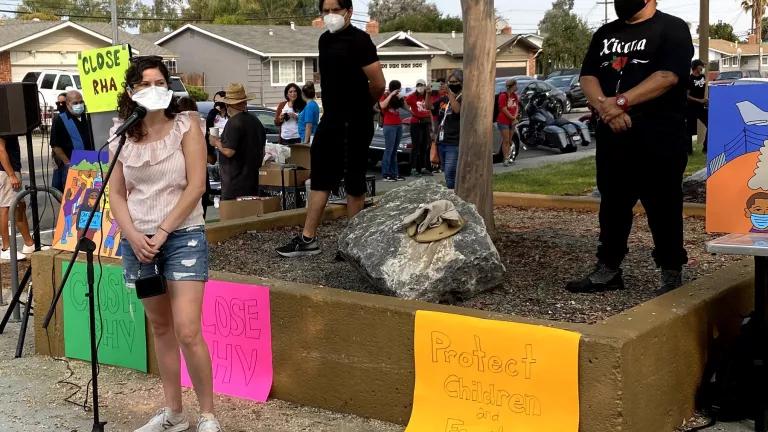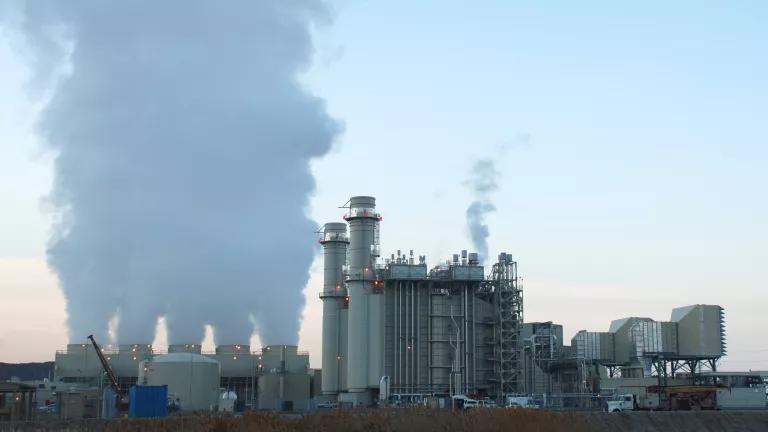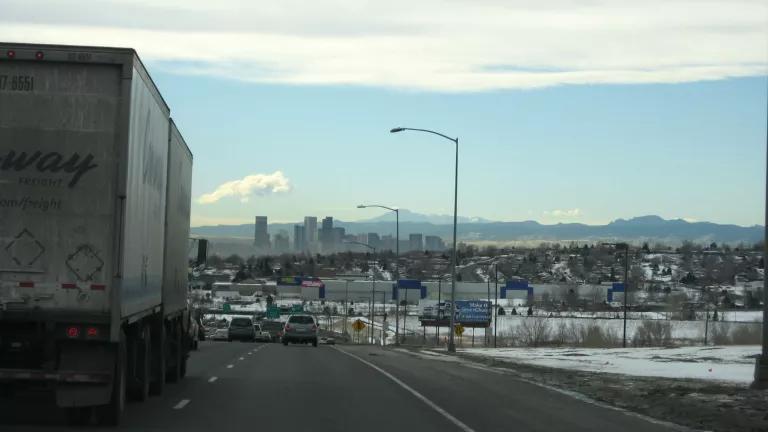Senate and House Spotlight Soaring Costs of Delay on Climate
Inaction on the climate crisis is costing us dearly.
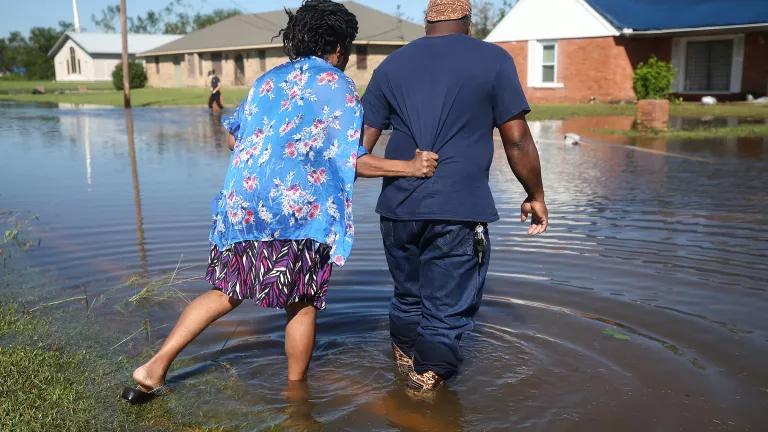
Patrick King and Soncia King walk through Hurricane Delta’s flood waters toward their home (right) in Lake Charles, Louisiana, on October 10, 2020. They were still repairing the damage from Hurricane Laura when Hurricane Delta made landfall.
Inaction on the climate crisis costs us dearly, but addressing the problem improves our health and saves us money.
Hearings on Capitol Hill today are a signal that our elected leaders are taking seriously overdue climate action and deliberating over a number of proposals from the Biden-Harris Administration on how to cut climate pollution. In addition to billions of dollars’ worth of damage to homes and businesses, farm crops, and critical infrastructure like roads and bridges each year, the climate crisis is also poised to inflict even greater damage to human health across the country and around the world-- and now is the time to recognize these costs and work hard to reduce them.
Climate Harms Are Getting More Dangerous and Expensive
Aggressive federal climate action is urgent, and the Biden administration is right to focus robust investment on addressing this problem because climate harms are reaching across this country with harrowing speed and ferocity: 2020 marked a record-setting year of costly disasters in the U.S. with more than 22 major climate and weather events by the federal government's count, totaling damages of at least $95 billion. But the good news is that smart financial investments proposed by the Biden administration will help us rebuild smarter and more equitably. These climate response policies will help individuals, families, communities to save money by reducing climate damages and the need for costly medical treatment, repairs to damaged structures, and recovery investments.
The Climate Crisis Fuels Costly Health Problems
Science clearly shows climate change will cost our country dearly the longer we delay taking action. How much? The 4th National Climate Assessment in 2018 pointed to hundreds of billions of dollars in property damage, but it’s unclear to what extent very real human suffering is included in that math. NRDC researchers estimated in a 2019 peer-reviewed study that just a subset of climate-sensitive events in the U.S. in one year (including a heat wave, wildfires, air pollution and allergenic pollen, disease outbreaks of West Nile virus and Lyme disease, and Hurricane Sandy) triggered $10 billion in health-related costs.
Our research study estimated that Medicare and Medicaid patients shouldered a disproportionately high burden of illness costs—two-thirds—which aligns with the of illness costs, which aligns with the evidence indicating that older people, communities of color, and the economically marginalized face the brunt of the health risks from climate change.
A Congressional Spotlight On Costly Risks
Today, the Senate Budget Committee will hold a hearing with experts testifying on the staggering costs of continued delay on climate action, and on the Biden administration’s climate action pledges. Following that, the House Select Committee on the Climate Crisis will convene a hearing on the same topic. These hearings will make it clear that climate action makes sense—for our health and for our pocketbooks. The federal government has a big role to play in helping to reduce these risks and costs to Americans. In order to reduce climate costs, federal leadership on three fronts is particularly important:
1. Reducing Carbon Pollution
Greenhouse gas emissions must be rapidly reduced by moving toward clean energy sources and supporting energy efficiency. Those actions will help to limit the most serious health effects related to climate change. NRDC strongly supports robust international, federal, state, and local efforts to limit the carbon pollution that is causing dangerous climate change.
2. Helping Communities to Prepare for Climate Risks
Climate-smart strategic planning that reduces health harms and associated health costs should become a priority at major healthcare facilities and at every level of government . Some examples include employing heat early warning systems and health advisories, opening public cooling and clean air centers, providing better disease surveillance, redesigning hospitals and communities to withstand floods and storms. The Biden administration’s recently proposed $100 million increase for the Center for Disease Control and Prevention’s Climate and Health program is a promising step forward on this front.
3. Investing in Staff and Local Understanding of Climate-linked Health Harms
Robust budgets and stronger staffing within state, tribal, local health departments are needed to understand and respond to climate impacts on health at the local level. As the COVID-19 pandemic demonstrates, poor investment, inadequate planning, and deficient alignment of public health response efforts is damaging and costly to health and economic prosperity.
Climate Delay Is Costly
Every day without a strong federal response to the climate problem costs us, because greenhouse gas pollution is accumulating in the atmosphere and fueling dangerous changes in the climate system. But the science also shows that public health and the economy benefit in the short-term by reducing climate pollution. For example, a 2020 study found that reducing carbon dioxide emissions by 30% would yield $21 billion–$68 billion in annual health benefits from cleaner air; a separate analysis of the U.S. Regional Greenhouse Gas Initiative identified at least $191 million in children’s health benefits across the northeast. Many additional studies identify the huge health and financial benefits of strong climate action.
Because of many years of halting progress on the climate front, federal leadership is more urgent than ever. For example, the U.S. Government Accountability Office (GAO) has since 2013 recommended limiting the government’s financial risk to climate disruption as a top priority because those risks are so widespread:
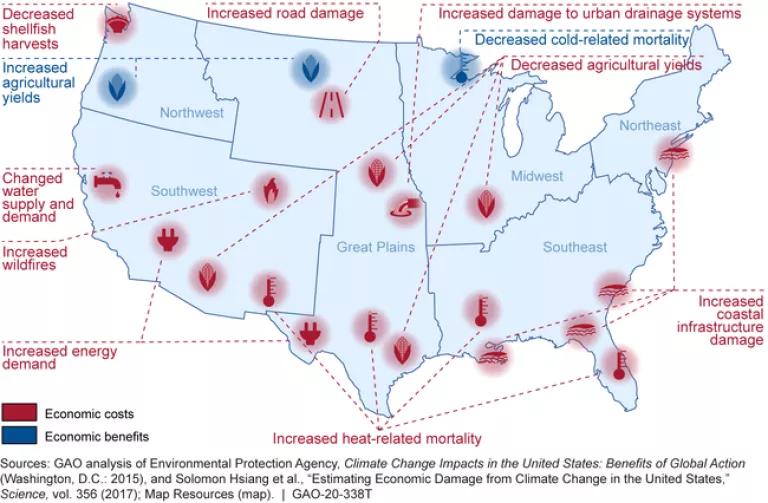
Examples of Potential Economic Effects from Climate Change by 2100 (Source: U.S. Government Accountability Office)
But since then, we have not made enough progress on this front. The decades of climate delays, distraction, and denial must end.
A Strong Response Will Reduce Harm and Expense
The climate crisis is an extremely costly problem in terms of both damage to human health and the economic hardship that climate-fueled problems impose on vulnerable communities. Measures to reduce carbon pollution are urgently needed, even as enhanced climate adaptation and public health preparedness can reduce climate-related costs to human health, buildings, crops, and infrastructure. As today’s hearings will demonstrate, further delay and inaction on the climate crisis comes with far too high a price.

